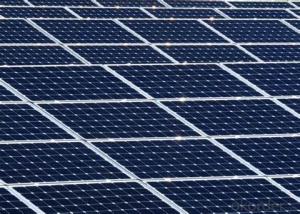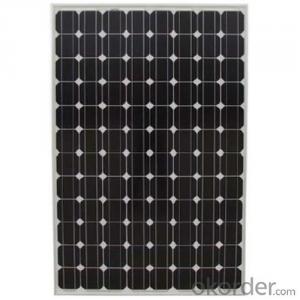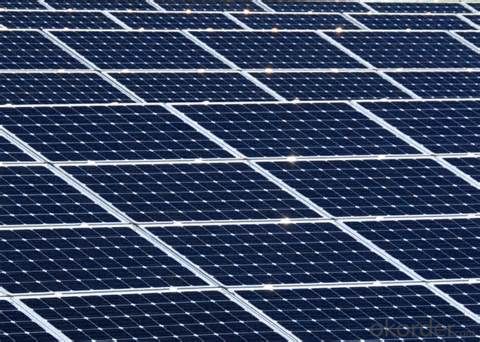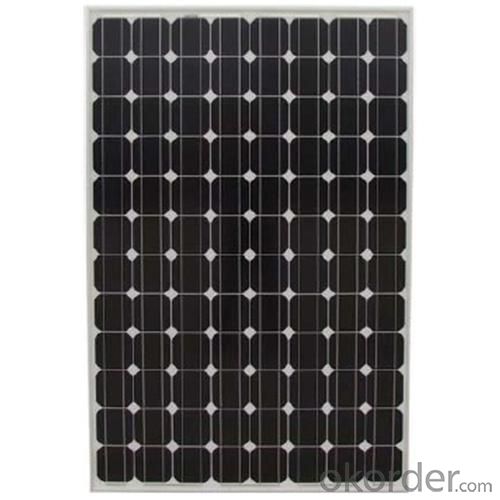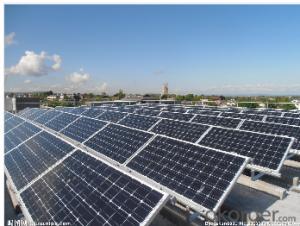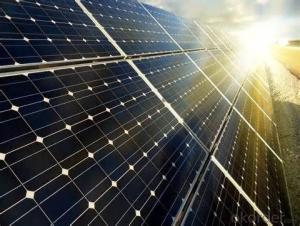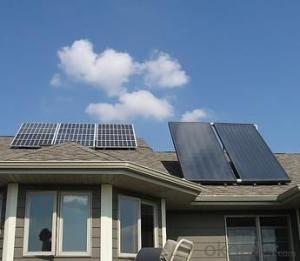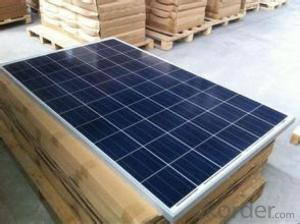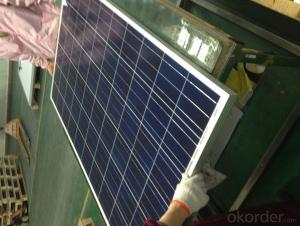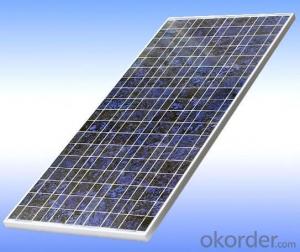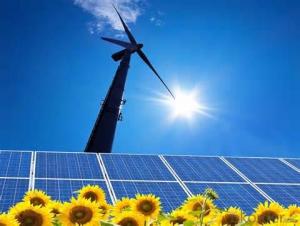200w Poly Solar Module with High Efficiency - Solar Panels for Sale Tucson
- Loading Port:
- Tianjin
- Payment Terms:
- TT OR LC
- Min Order Qty:
- 1 watt
- Supply Capability:
- 100000 watt/month
OKorder Service Pledge
OKorder Financial Service
You Might Also Like
Specification
Product Description:
1.Structure of Solar Module Description
CNBM Solar's photovoltaic module is designed for designed for large electrical power requirement. It is the optimal choice for both on-grid and off-grid power systems. CNBM Solar offers high performance of power per square foot of solar array.
2.Main Features of the Solar Module
Solar Cell: High efficency crystalline solar cell. Even if under the weak light, the solar module can produce maximum power output.
Tempered glass: Anti-reflecting coating and high transmission rate glass increase the power output and mechanical strength of solar module.
EVA and TPT: Using high quality EVA and TPT to prevent destroying and water.
Strong aluminum frames to strengthen the load hold and to stand against high wind.
Junction box: Multi function junction box with water proof.
Long lifetime: ≥25 years; Less power decrease.
Good performance of preventing from atrocious weather such as wind and hails.
Resisting moisture and etching effectively, not effected by geology.
The certificate issued by international authority: UL, TUV, IEC, VDE, CE.
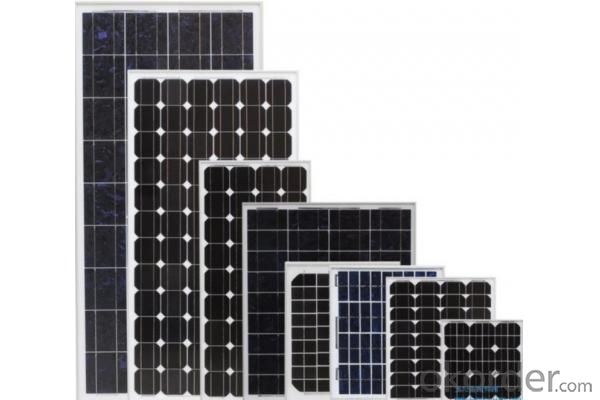
Solar panel working process
In addition to being the ultimate source of all life on earth, the sun is an infinitely renewable, completely pollution-free source of electricity. Instead of burning fossil fuels dug up from the ground in a big power plant – a very 19th century, industrial age approach, when you think about it – solar panels convert sunlight directly into electricity, with no harmful emissions.
The basic unit of a solar panel is a solar cell, which usually consists of one or two layers of silicon-based semiconductor wafers. When struck by the photons in sunlight, the solar cell generates an electrical charge due to the "photovoltaic effect" – which is a pretty good name, since it produces voltage from photons. The flow of these electrons moves in a steady electrical current from one side of the cell to the other.
Dozens of these PV cells are packaged together into solar modules, which in turn are packaged into solar panels that are mounted on a rooftop and arranged to maximize their hours of exposure to direct sunlight. Because the electricity generated by all those solar cells is direct current (DC), it is then sent to an inverter that transforms the power into the same alternating current (AC) used by the appliances in your home and the local utility electricity distribution grid. Increasingly, these inverters are getting "smart," providing data monitoring for solar installation performance and other grid integration services.
- Q: Can solar panels be used in areas with high levels of rainfall?
- Yes, solar panels can be used in areas with high levels of rainfall. While excessive water exposure can affect the performance of solar panels in the short term, modern solar panels are designed to withstand different weather conditions, including rain. Proper installation and maintenance can ensure their efficiency and longevity, even in areas with high rainfall.
- Q: how much electricity will produce in Kwh by a 000 W solar panel in a sunny tropical area per day (good sunlight at least 0 hour a day)
- Duh - 000 W panel (rated in good sunlight) in 0 hours of good sunlight. Let me see - 0 * 000 = 0,000 wh or 0 kwh. Yup.
- Q: I have made a 5v dc 52watt solar panel and I going to be trying to charger 4 2v dc 55ah batteries. I get about 6 hours of sun on my panel. Spec below, is that a big enough panel to charge the batteries???I have 30 3x6 solar cells wired together Cell Specifications: (Watts): .75 Wp (Amps): 3.5 Imax (Volts): 0.5 V max which is where I got my 5g 52watt max (if math is wrong plz tell me) The Battery type: 2Volt 55.0ah NB Sealed Lead Acid Battery. I am using a mppt solar charger.
- Technically, any solar panel can charge any battery, but it would take quite a long time do do so if it is a large battery. If you are aware of the voltage and either amp or watt rating of the unit that is usually used to charge the battery, the solar panel should have a similar power output to that charger to work well. amps and watts are quite similar, and can be converted with this simple formula: W=watts; V=volts; A=amps; W/V=A; V*A=W; When charging batteries, it is always wise to use less amps than needed, and roughly the same voltage as the battery being charged. The less amps used to charge batteries means the battery will take longer to charge but will last a lot longer in the long-term. Your solar panel should be sufficient to charge the battery, but you should test charge it to see if it works well. I recommend using a multimeter to check the batteries voltage every couple of hours. Once the battery reaches 2v, it should be fully charged. You should also check the amps in case they are not at the expected value (take caution when checking amps with a multimeter, when i do it i always end up melting my multimeter leads). The battery should be fully charged from anywhere between 6-48 hours. if it is charging faster, the solar panel has too much power. if it doesn't charge in this time frame, the solar panel is not powerful enough.
- Q: Can solar panels be installed on a condominium or apartment building?
- Yes, solar panels can be installed on a condominium or apartment building. However, it may require certain considerations such as the availability of suitable roof space, permissions from the building owners or management, and potential impact on other residents. Additionally, installation and maintenance costs may need to be shared among tenants or considered in the building's budget.
- Q: Can solar panels be installed in areas with high levels of air pollution?
- Yes, solar panels can be installed in areas with high levels of air pollution. While air pollution can potentially have a slight impact on the efficiency of solar panels, it is not a significant barrier to their installation and operation. Solar panels primarily rely on sunlight, which is still present even in polluted areas. Additionally, solar panels can even contribute to reducing air pollution by providing clean energy alternatives.
- Q: I have been thinking about getting solar panels for my house. What do you think I should get? Companies? Prices? I also have another question. How much energy can a small solar panel produce?
- A small panel will not produce much power. When people put solar electric panels on their house with the goal of saving money, they generally put up a lot of large panels - 200 or 500 square feet worth. Its hard to save money with just one panel. The only way to get close on how much it will cost and whether that represents a savings is to get out your electric bills for the past year, and call a local solar installer for a quote. The system on our house cost $20,000 and we got back $8,000 in incentives, so $2,000 net. It can save money, but that will be over many, many years.
- Q: Can solar panels be installed on a winery or vineyard?
- Yes, solar panels can be installed on a winery or vineyard. In fact, they are becoming increasingly popular in the wine industry due to their numerous benefits such as reducing energy costs, promoting sustainability, and mitigating carbon emissions. Solar panels can be installed on rooftops, carports, or ground-mounted systems in areas where they can receive maximum sunlight exposure.
- Q: how to use a motor with solar panel
- photograph voltaic capability is somewhat fluctuating capability source and so it may be greater advantageous if u could save the photograph voltaic capability in a battery. The battery is then related to the motor. returned connect the motor with a zener diode to the photograph voltaic panel because of the fact if u dont u could have a case of decrease back emf producing from the motor and getting discharged interior the photograph voltaic panel that could injury it. further the battery additionally ought to be having a diode circuit which might avert it style discharging into the photograph voltaic panel. hoping that this facilitates..
- Q: How do solar panels affect the energy independence of a building?
- Solar panels can greatly enhance the energy independence of a building by converting sunlight into electricity. By generating their own clean and renewable energy, buildings with solar panels can reduce or even eliminate their dependence on traditional energy sources like fossil fuels or the grid. This not only reduces the carbon footprint but also provides a sustainable and reliable source of power, ultimately granting greater energy independence to the building.
- Q: How do solar panels affect the roof's integrity?
- Solar panels can have a positive impact on a roof's integrity. By acting as a protective layer, solar panels shield the roof from various weather elements, including harmful UV rays, hail, and debris. Additionally, they can help to extend the lifespan of the roof by reducing exposure to extreme temperatures. However, it is crucial to ensure proper installation by professionals to avoid any potential damage or leaks.
Send your message to us
200w Poly Solar Module with High Efficiency - Solar Panels for Sale Tucson
- Loading Port:
- Tianjin
- Payment Terms:
- TT OR LC
- Min Order Qty:
- 1 watt
- Supply Capability:
- 100000 watt/month
OKorder Service Pledge
OKorder Financial Service
Similar products
Hot products
Hot Searches
Related keywords
